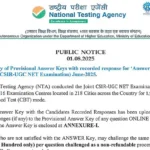Supreme Court Justice Abhay Oka on Saturday expressed concern over the inadequate infrastructure provided to the judiciary in Maharashtra, contrasting it with the situation in Karnataka. Speaking at the Ashok Desai Memorial Lecture on “What Ails Our Criminal Justice System – Some Thoughts,” he lamented the struggle to obtain even basic facilities from the Maharashtra government. The judge pointed out that there are “too many” ailments in our criminal justice system. However, he emphasized that the concept of a “fair trial” exists, citing the example of Ajmal Kasab, who was given a fair trial.
Justice Oka was a judge of the Bombay High Court before being appointed as the Chief Justice of the Karnataka High Court, from where he was later elevated to the Supreme Court. Desai was a former Solicitor General and Attorney General of India.
Justice Oka said, “We struggle to get infrastructure from the Maharashtra government. We lack basic infrastructure. It is very, very difficult to get infrastructure from the Maharashtra government.” He cited the example of Pune’s civil court complex, where judges do not have separate chambers. However, he acknowledged that there had been some improvement over the past five years.
Drawing a comparison, Justice Oka praised Karnataka’s approach, where the judiciary’s demands are met without resistance. “The scenario in Maharashtra is very different. In Karnataka, whatever the judiciary asks for, the government provides. The Kalaburagi bench of the Karnataka High Court looks like a five-star hotel,” he noted.
Highlighting that the “ailments” in the criminal justice system are “too many and not just one,” Justice Oka said that while celebrating 75 years of the Constitution of India, we must introspect. However, he proudly stated that criminal law envisages the concept of a “fair trial,” which was extended even to Ajmal Kasab, the lone surviving terrorist in the 26/11 attacks on Mumbai. “In the context of criminal law, there is a concept of a fair trial, which is part of Article 21. There are safeguards against arrest… I feel proud to say that our country gave even Kasab a very fair trial.”
However, the judge noted that the criminal justice system has not met the expectations of the common man. One of the major issues, he said, is the arbitrary nature of arrests. Referring to Section 41 of the Criminal Procedure Code (CrPC), he stressed that the police are not required to arrest every accused person, even in cases where the offence is punishable by more than seven years in prison. “The presence of an accused for investigation can be secured by issuing summons. But the ground reality is different. There is a lot of pressure on the police from citizens, NGOs, political leaders, and the media,” he observed.
He criticized the prevailing mindset that equates arrest with guilt. “This is a sad reflection of the retributive tendency in our society. People still believe that once a person is arrested, he is guilty,” he said. He also condemned the rise of media trials, stating that they create misconceptions about the legal system. “Every citizen has a right to criticize judgments, but it must be constructive… Judges cannot go by social media perceptions; we have to go by evidence,” he asserted.
Justice Oka emphasized that “bail is the rule, jail is the exception,” but acknowledged that courts today have to conduct a more detailed examination of cases before granting bail. Laws such as the Unlawful Activities (Prevention) Act (UAPA), the Prevention of Money Laundering Act (PMLA), and the Narcotic Drugs and Psychotropic Substances Act (NDPS) have made bail more difficult. “Courts burdened with these cases are not able to hear regular bail matters. If you look at very old cases, the High Court used to simply say ‘bail granted,’ and no one questioned it. Now, courts have to walk a tightrope,” he remarked.
Justice Oka stressed that the judiciary often bears the burden when the police fail to provide timely redressal. “A common man approaches the court when the police do not lodge his complaint or when he feels the investigation is flawed. There needs to be a grievance mechanism for complainants who have issues with the way the probe is being conducted,” he suggested.
Justice Revati Mohite Dere of the Bombay High Court, who also spoke at the event, highlighted the skewed judge-to-population ratio in India. She pointed to various challenges, including trial delays, overburdened courts, and overcrowded jails. Additionally, she called for a stronger witness protection scheme to ensure the safety of those testifying in criminal cases.
When asked by an audience member about the use of Artificial Intelligence (AI) in the judiciary, Justice Oka said it cannot replace human intelligence. “AI will find results based on data, which can be wrong. In criminal law, only the human mind can appreciate evidence.”
In India a total of 4.58 crore cases are pending in trial courts. Out of which 3.48 crores are criminal cases.
Total pendency across all High Courts is 62.5 lakhs of which 18.25 lakhs are criminal cases.
In Maharashtra in district cases almost 55 lakh cases are pending of which 38 lakhs are criminal cases.
In Mumbai’s Magistrate Courts they have more than 6 lakh pendency and in the city’s sessions court it is more than 46,000.
In Bombay High Court, total pendency of criminal cases is more than 1 lakh and Bail Applications pending are 5,000.
In leading districts like Mumbai, Thane, Pune etc pendency of bail applications exceed 1,800.




